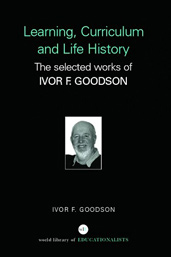Learning, Curriculum and Life Politics: the selected works of Ivor F. Goodson
Long Waves of Educational Reform
Introduction
Restating the problem: the salience and invisibility of ‘time’
This chapter grows out of work on the ‘Change Over Time’ project conducted in the USA and Canada between 1998 and 2004 and funded by the Spencer Foundation. In naming our project ‘Change Over Time’, we were hoping to highlight an aspect of our study which we judged to be worthy of wider concern and interest. It is a recurrent mystery to those with historical training that so many of our social studies, particularly one might argue our educational studies, take time for granted. We might seek to explain this by the current obsession with contemporary change, by the ‘velocity of change’ itself, or by the progressive erosion of foundational disciplines, such as ‘history of education’. But such assertions would themselves be a-historical; ignoring time, for the taken-for-grantedness of time is one of the great continuities.
Yet we live our lives by the clock; we are in fact regulated by time everyday. This is the paradox – that which is all-pervasive becomes invisible to us. As Young and Schuller (1988) noted in their pioneering study, The Rhythms of Society, “if we are not only obsessed with clock-time but getting more so, it is all the more strange that social scientists should have done so little to make time one of their special apprehensions” (p. 2). This mysterious omission is common in studies of education and schooling. In this sense, the scholar of education reflects the consciousness of his or her subjects – the teachers, administrators and students, who take time for granted.
The everyday authority of time is, even in a permissive society, so complete that it rarely appears as problematic, and if it is not problematic to the people who are the subjects, it will not be all that problematic – to the other people… (Young and Schuller 1988, p. 3).
There is, however, a particular and peculiar irony in the fact that studies of social ‘change’ – herein educational and school ‘change’ – should ignore time. It seems prima facia, a major omission. After all, if change is about anything, it is about time. Yet a cursory examination of the literature will, we think, confirm that this is the case. Many of the most eminent contemporary change theorists ignore time. They should be reminded that to ignore time is to ignore history, and to ignore history is to ignore human agency in its fullest application.
A wide range of contemporary studies of school change, including cross-site studies, work primarily with snapshot notions of social context and time (e.g. Fullan 1999; 2000; Lieberman 1995). This predominant category of school change study does not allow the change and reform efforts to be ‘grounded’ in trajectories of influence and causation which are linked to the past, or indeed pursued longitudinally from the past into the present and from there into the future. This a-historical feature of the dominant change literature is pervasive and endemic. Indeed it enters the very rhetoric of ‘change’, which is somehow seen as uniquely powerful at this time of global restructuring. (As we shall see later, this is a contention with some virtue, but it must be painstakingly established historically, not polemically assumed and asserted.) Again history alerts us to continuities:
Once time is recognized as a continuous flow – with the essential continuity being the flow itself – what is being observed cannot be anything other than change, continuous change. This is not to say there is no pattern, no structure in the welter. But whatever has pattern, structure, an appearance of the static, is made up of change, change wrapped within change (Young & Schuller 1988, p. 5).
